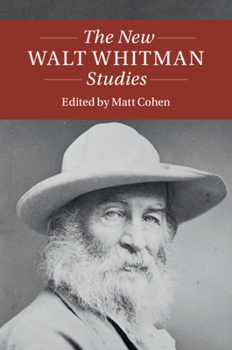The New Walt Whitman Studies
(Part of the Twenty-First-Century Critical Revisions Series)
This book highlights some of the latest currents in Whitman scholarship and demonstrates how Whitman's work can speak to and transform discussions in literary studies during a time of great intellectual ferment. It is organized into three sections, addressing aesthetics and politics, new reading methods, and histories of the critical imagination. This volume contains innovative work on Whitman in a range of fields. With the explosion of the digitization...
Format:Hardcover
Language:English
ISBN:1108419062
ISBN13:9781108419062
Release Date:January 2020
Publisher:Cambridge University Press
Length:236 Pages
Weight:1.10 lbs.
Dimensions:0.7" x 6.2" x 9.1"
Customer Reviews
0 rating





